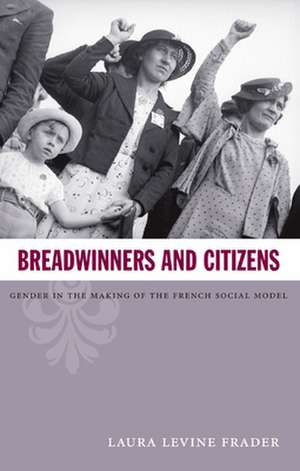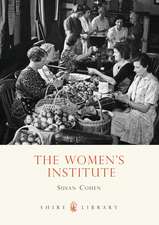Breadwinners and Citizens – Gender in the Making of the French Social Model
Autor Laura Levine Fraderen Limba Engleză Paperback – 27 mar 2008
Preț: 300.83 lei
Nou
Puncte Express: 451
Preț estimativ în valută:
57.56€ • 60.25$ • 47.91£
57.56€ • 60.25$ • 47.91£
Carte tipărită la comandă
Livrare economică 31 martie-14 aprilie
Preluare comenzi: 021 569.72.76
Specificații
ISBN-13: 9780822341987
ISBN-10: 0822341980
Pagini: 360
Dimensiuni: 152 x 235 x 15 mm
Greutate: 0.49 kg
Editura: MD – Duke University Press
ISBN-10: 0822341980
Pagini: 360
Dimensiuni: 152 x 235 x 15 mm
Greutate: 0.49 kg
Editura: MD – Duke University Press
Cuprins
Acknowledgments vii
Introduction: Gender in the Making of the French Social Model 1
1. Reconstruction and Regeneration after World War I 15
2. Gender Division, the Family, and the Citizen-Worker 51
3. Managing the Human Factor 103
4. Organized Labor, Rationalization, and Breadwinners 139
5. Toward the Social Model: Citizenship, Rights, and Social Provision 169
6. Economic Rights and the Gender of Breadwinners: The Depression of the 1930s 193
Conclusion 229
Notes 241
Bibliography 301
Index 335
Introduction: Gender in the Making of the French Social Model 1
1. Reconstruction and Regeneration after World War I 15
2. Gender Division, the Family, and the Citizen-Worker 51
3. Managing the Human Factor 103
4. Organized Labor, Rationalization, and Breadwinners 139
5. Toward the Social Model: Citizenship, Rights, and Social Provision 169
6. Economic Rights and the Gender of Breadwinners: The Depression of the 1930s 193
Conclusion 229
Notes 241
Bibliography 301
Index 335
Recenzii
A stunning analysis of why defense of the French male breadwinner became a keystone of social policy after 1918, even as France depended mightily on the labor of women and foreigners to revitalize its economy. Laura Levine Frader has mastered an immense social and cultural landscape to make a convincing case for the interwar origins of todays social-policy mix in France. She is superb, too, on the interplay of race, ethnicity, and gender.Herrick Chapman, New York University, coeditor of A Century of Organized Labor in France: A Union Movement for the Twenty-first Century?In this valuable book, Laura Levine Frader focuses on the French social model, the ideal of egalitarian social citizenship shaped and refined in the first half of the twentieth century. She argues that it was systematically undermined by employers, organized labor, and the state itself through practices and policies that built into it gender and anti-immigrant biases. Her insights, methods, and conclusions will be interesting to historians of other industrial societies whose welfare states are today under challenge from women and immigrant workers seeking equality of treatment.Herman Lebovics, SUNY Trustees Distinguished Professor, Stony Brook University, author of Bringing the Empire Back Home: France in the Global Age[Frader] highlights the centrality of gender to the reconstruction of French Society after the First World War...She is particularly strong on the inter-play between gender, race and ethnicity, outlining the position of colonial male workers both in the workplace and in the minds of employers and policy makers...In this sense, the book also represent a significant addition to the understanding of inter-war French society, and of the development of European welfare legislation. Overall, this book provides an important contribution to the literature on social reform, employment and gender. As a result, it would be of interest to historians of gender and labour, as well as to historians of twentieth-century France.-Alison Carrol, The Journal of the Historical Association, Volume 97, Issue 2, Number 314, April 2009
Notă biografică
Laura Levine Frader
Textul de pe ultima copertă
"In this valuable book, Laura Levine Frader focuses on the French social model, the ideal of egalitarian social citizenship shaped and refined in the first half of the twentieth century. She argues that it was systematically undermined by employers, organized labor, and the state itself through practices and policies that built into it gender and anti-immigrant biases. Her insights, methods, and conclusions will be interesting to historians of other industrial societies whose welfare states are today under challenge from women and immigrant workers seeking equality of treatment."--Herman Lebovics, SUNY Trustees Distinguished Professor, Stony Brook University, author of "Bringing the Empire Back Home: France in the Global Age"
Descriere
Contradictions in the French welfare state and its self-image as an egalitarian system














